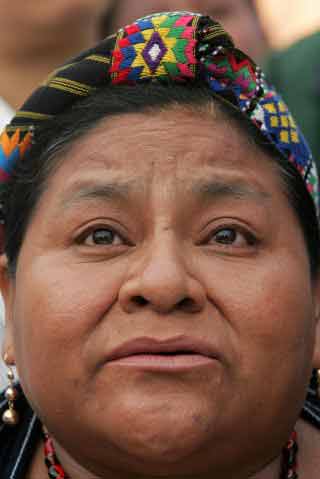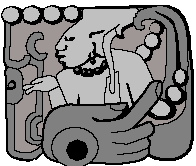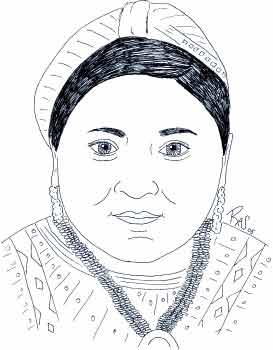- Rigoberta Menchú Tum
- Human Rights Leader for Guatemala/1992
Nobel Peace Prize
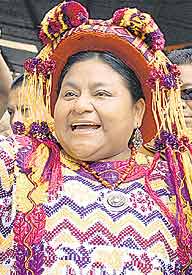
-
-
Guatemala, 24 de septiembre de 1996
-
-
Gifts
of Speech - Sweet Briar College
-
When European explorers 'discovered'
lands on the other continents,
there were already people living there. All too often
the explorers took
the land away from the native or indigenous peoples
and either killed
them or suppressed them. In many cases, the native
languages and
cultures were suppressed and the natives were forced
to adopt Western ways.
Unfortunately, this isn't just a thing of the past --
many indigenous peoples and their cultures are still
threatened today.
-
Rigoberta Menchú was awarded the Nobel Peace Prize in
recognition of her work for social justice and
ethno-cultural reconciliation based on respect for the
rights of indigenous people.
Menchú was born into a poor Indian peasant family, and
raised in the Quiche branch of the Mayan culture in
Guatemala. As a teenager, she became involved in social
reform programs of the Catholic Church and was active in
the women's rights movement. Like her father, she joined
the CUC (Committee of the Peasant Union) in 1979, after
members of her family had suffered persecution.
During the 1970s and 1980s in Guatemala, tensions between
the descendants of European immigrants and the native
Indian population increased.
At this time Menchú became active in large
demonstrations, joined the radical 31st of January Popular
Front, and encouraged the Indian peasant population to
resist oppression.
In 1981, because of her activism, she had to leave
Guatemala and flee to Mexico, where she organized
peasants' resistance movements and was co-founder of the
United Representation of the Guatemalan Opposition (RUOG).
Through her life story, which was published as I,
Rigoberta Menchú and a film entitled When the
Mountains Tremble, which illustrates the struggles
and sufferings of the Maya people. Menchú also became well
known in the Western world as an advocate of Indian rights
and ethno-cultural reconciliation. Rigoberta Menchú
accepted the 1992 Nobel Peace Prize in the name of all
indigenous people.

Nobel Peace Prize Laureate
by - Kim Rader
Rigoberta Menchú Tum is a Guatemalan leader
internationally known for her work in the promotion of the
defense of human rights, peace and Indigenous Peoples'
rights. She received the Nobel Peace Prize in 1992,
becoming the first Indigenous and the youngest person ever
to receive this distinction.
For Rigoberta Menchú Tum, this Nobel Peace Prize
acknowledges the struggles of Indigenous Peoples. It is
also a symbolic recognition of the victims of repression,
racism and poverty as well as an homage to Indigenous
Women.
Rigoberta Menchú Tum was born in 1959 in the village of
Chimel, Guatemala, a community continuing the
millennium-old Maya-Quiché culture. In her youth she
worked in the fields and later in the city as a domestic
employee. She lived in the midst of the injustice, misery
and discrimination suffered by the Indigenous Peoples of
Guatemala. Various members of her family were tortured and
asassinated by the repressive armed forces. Persecuted,
Rigoberta was exiled to Mexico in 1980.
Self-educated, she has shown herself to be a natural
leader of great intelligence. She became an active
political worker in labor, campesino and human rights
groups as well as in the defense and promotion of the
rights and values of Indigenous Peoples. In 1983 her
testimonial book, I, Rigoberta Menchú, An
Indian Woman in Guatemala , was
published, followed by various of her texts and poems.
Through her work, Rigoberta has received world wide
recognition and several honorary doctorates. In 1993, she
was nominated by the United Nations as Goodwill Ambassador
for the International Year of the Indigenous Peoples. At
present, she is the Promoter of the International Decade
of Indigenous Peoples, mandated by the General Assembly of
the United Nations and was also appointed to be the
personal advisor to the general director of UNESCO.
Concurrently she presides over the Indigenous Initiative
for Peace.
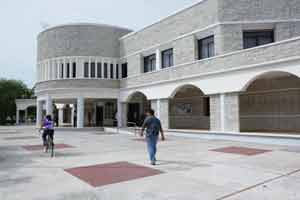
Goals of the Rigoberta Menchú Tum Foundation

In view of the urgent need for change in
our society,
the Rigoberta Menchú Tum Foundation looks
to contribute in the following ways:
Prevention of conflicts, mediation for the
negociated solution
of conflicts. Preservation of peace. Development, social
justice,
diversity and plurality as a base for peace.
Support of Indigenous communities affected by conflict.
Promotion of human rights.
Respect for life, social justice and
democracy. Civil,
political, cultural, economic and social rights.
Rights of Indigenous Peoples.
Land, culture, liberty, sovereignty,
education, development of an
integral community, health care, access to national and
international instruments of justice, community rights
over individual rights.
Values of Indigenous Peoples.
Promotion of their world view. Culture,
ethics, history,
harmony with nature, respect for diversity, refusal of
racism, discrimination and subordination.
Women's rights.
Rights specific to the Indigenous woman,
right to full participation,
to take part in all decisions that concern them, equality
in all areas,
health care, education, culture, identity, right to own
land and the right to organize.
Rights of children and youth as a
guarantee of the future.
Better quality of life, health care,
multilingual and
multi-cultural education, the right to progress.
Development.
Right to options of development with
respect to the cultural
values and traditions of the communities. Development
with social justice. Right to sustainable development.
Dignified quality of life.
To support the communication and relationship between
the different Indigenous Peoples. Help to obtain support
for
projects of different Indigenous communities of the world.
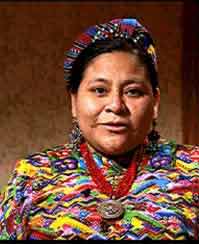
International Decade of Indigenous Peoples Worldwide
Active promotion and participation in the development of
the International Decade of Indigenous Peoples Worldwide
declared by the UN in December of 1994.
Promote and divulge the causes, values and rights of
Indigenous Peoples to stimulate concrete actions that
support the initiatives of said people in order to improve
their conditions of life and preserve their cultural
identity.
In Guatemala, the Foundation carries out projects
directed at education, health care, and human rights, with
an emphasis on citizen's civil rights. In the area of
community development, its projects involve housing and
urban planning, as well as agricultural production. In the
field of rights and values of Indigenous Peoples, the
Foundation makes efforts to strengthen the unity between
different groups of Indigenous Peoples, to promote their
mutual cooperation and reflection on their rights and
values.
The support of the Indigenous Initiative for Peace
is one of the Foundation's priorities. As a base for the
establishment of democracy, peace and reconciliation in
Guatemala, the Foundation is devoting a special effort on
civic education to encourage citizen participation.
The Rigoberta Menchú Tum Foundation has received and
continues to receive technical and financial support from
governmental and non-governmental entities. Countries such
as: Germany, Australia, Belgium, Canada, Spain, the United
States, France, Greenland, Holland, Italy, England, Japan,
Mexico, Norway, Sweden and Switzerland.
In addition, it maintains important cooperative relations
with various organisms of the United Nations as well as
with other international institutions.
The Rigoberta Menchú Tum Foundation is aiding the return
of Indigenous Guatemalans exiled since the early eighties
in the southeast of Mexico. This return process was
initiated in 1993; since then, thousands have returned to
Guatemala. The Foundation provides technical and
operational assistance in the acquisition of their new
land. It also develops projects relating to housing,
education, health care, farming and training as well as
specific projects for Indigenous women and children.
In Guatemala, the Foundation is contributing to the
expression of human rights through the campaign for civil
participation and education for democracy and peace.
The Foundation's work is also largely aimed toward social
justice and improved quality of life for the population of
Guatemala, especially for Indigenous communities.
On the international level, the Foundation
has played a major role in the Summits of Indigenous
Leaders; through its president, it has participated in
efforts to promote the peaceful solution of controversies
and conflicts that affect Indigenous Peoples. It is also
actively working toward the inclusion and the defense of
Indigenous Peoples' claims within international
institutions.
Rigoberta Menchú Tum
Premio Nobel de la Paz
Heriberto Frias 339
Col. Narvarte
03020 Mexico, D.F.
Mexico
Fax: (+52+5) 638-0439
E-mail: rmtpaz@laneta.igc.apc.org
 Return to Indigenous Peoples' Literature
Return to Indigenous Peoples' Literature
Compiled by: Glenn
Welker
ghwelker@gmx.com
Copyright
@ 1993-2016
This page last updated 05/31/2019 13:44:53
This site has been accessed 10,000,000 times since
February 8, 1996.
